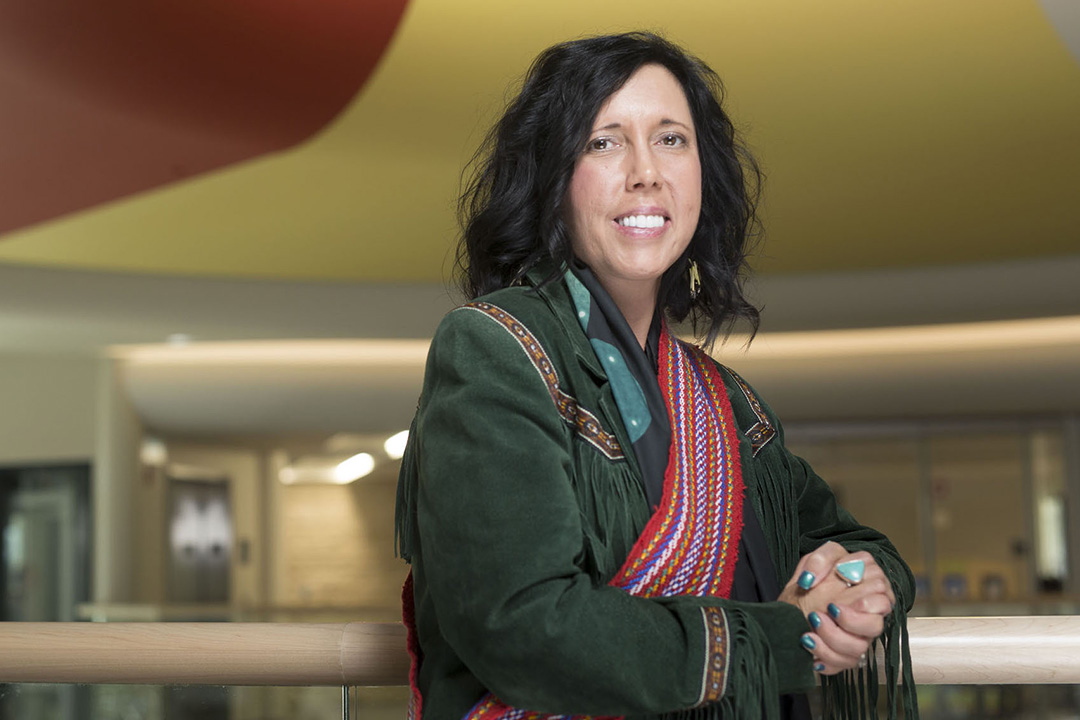
USask Indigenous health leader appointed to national COVID-19 Immunity Task Force
University of Saskatchewan (USask) Indigenous health research leader Dr. Carrie Bourassa has been appointed as the Indigenous Engagement Lead on the federal COVID-19 Immunity Task Force. The leadership group will oversee national efforts to measure the scope and scale of SARS-CoV-2 immunity across Canada.
By USask Research Profile and Impact
The major two-year initiative—part of a $350-million project to expand national testing and modelling announced April 23 by Prime Minister Justin Trudeau—aims to provide decision makers with the best science to manage the epidemic and help safely get Canadians back to work.
“I am very honoured to serve on this important task force that will provide an unprecedented mapping of SARS-CoV-2 immunity nationwide, including immunity levels among Indigenous populations,” said Bourassa, Scientific Director of the CIHR Institute of Indigenous Peoples’ Health and professor of community health and epidemiology at the USask College of Medicine. “I look forward to making sure that Indigenous voices are heard and represented.”
The leadership group, co-chaired by McGill professor Catherine Hankins and University of Toronto professor David Naylor, brings together 15 prominent leaders with relevant university, hospital and public health expertise. Drawing on expertise from universities and hospitals across Canada and working closely with provincial and territorial public health officials, the task force will generate first estimates of SARS-CoV-2 immunity, both overall and in priority populations across Canada.
“We want things to move quickly so that we start having an idea of the levels of seroprevalence and immunity by the end of May,” said McGill professor Tim Evans, in a recent interview with the McGill Reporter. Evans leads the task force secretariat supported by the Public Health Agency of Canada.
Blood tests for SARS-CoV-2 antibodies are the key tool to determining how many Canadians have already been infected. The task force will use extensive blood testing to determine the extent (incidence and prevalence) of SARS-CoV-2 in the population and in sub-groups such as health-care workers and other essential workers, elderly, young adults, northern communities, and Indigenous populations. Understanding population susceptibility to the virus will provide a basis for immunization strategies when a vaccine becomes available. More information about the task force is available here: https://www.covid19immunitytaskforce.ca/
Bourassa and Morning Star Lodge, an Indigenous community-based health research lab in Regina, have launched a Protecting Our Home Fires strategy to inform Indigenous communities about the risks of COVID-19 infection and how to prevent its spread.
“I am very honoured to serve on this important task force that will provide an unprecedented mapping of SARS-CoV-2 immunity nationwide, including immunity levels among Indigenous populations,” said Bourassa, Scientific Director of the CIHR Institute of Indigenous Peoples’ Health and professor of community health and epidemiology at the USask College of Medicine. “I look forward to making sure that Indigenous voices are heard and represented.”
The leadership group, co-chaired by McGill professor Catherine Hankins and University of Toronto professor David Naylor, brings together 15 prominent leaders with relevant university, hospital and public health expertise. Drawing on expertise from universities and hospitals across Canada and working closely with provincial and territorial public health officials, the task force will generate first estimates of SARS-CoV-2 immunity, both overall and in priority populations across Canada.
“We want things to move quickly so that we start having an idea of the levels of seroprevalence and immunity by the end of May,” said McGill professor Tim Evans, in a recent interview with the McGill Reporter. Evans leads the task force secretariat supported by the Public Health Agency of Canada.
Blood tests for SARS-CoV-2 antibodies are the key tool to determining how many Canadians have already been infected. The task force will use extensive blood testing to determine the extent (incidence and prevalence) of SARS-CoV-2 in the population and in sub-groups such as health-care workers and other essential workers, elderly, young adults, northern communities, and Indigenous populations. Understanding population susceptibility to the virus will provide a basis for immunization strategies when a vaccine becomes available. More information about the task force is available here: https://www.covid19immunitytaskforce.ca/
Bourassa and Morning Star Lodge, an Indigenous community-based health research lab in Regina, have launched a Protecting Our Home Fires strategy to inform Indigenous communities about the risks of COVID-19 infection and how to prevent its spread.

